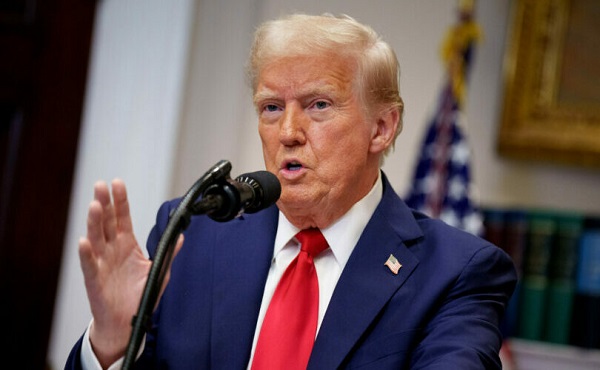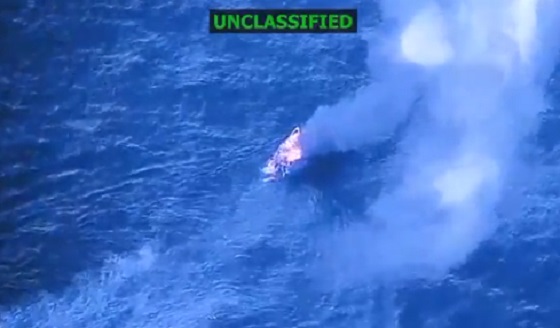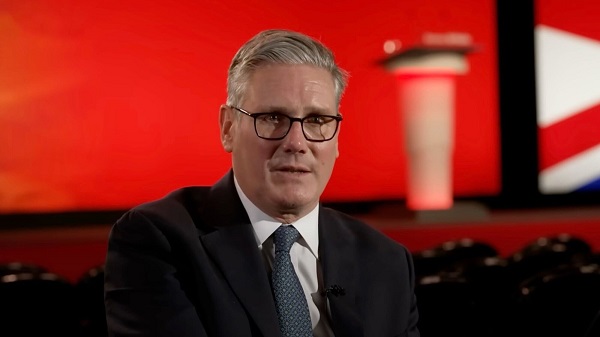From The Center Square
By

By Frank Wright
As Donald Trump publishes a stark warning to Hamas, news emerges that his administration is also engaged in direct negotiations with the militant group to secure a lasting peace deal in Gaza.
A statement released on Trump’s Truth Social account and by the White House reads:
“Release all of the Hostages now, not later, and immediately return all of the dead bodies of the people you murdered, or it is OVER for you. Only sick and twisted people keep bodies, and you are sick and twisted! I am sending Israel everything it needs to finish the job, not a single Hamas member will be safe if you don’t do as I say.”
The statement followed Trump’s meeting at the White House with some of the Israeli hostages released following a deal brokered by his initiatives and led by Trump’s envoy Steve Witkoff.
“We believe you have been sent by God to save us,” Trump was told. Israel media reported hostage relatives asking, “Why does Witkoff (Steve Witkoff, US Envoy to the Middle East) answer us but not our own ministers?”
Trump is credited by the released hostages and their families with saving their lives, whilst Israeli leader Netanyahu has been accused of having “sabotaged” every hostage deal for the past year, with his own national security minister saying Netanyahu “sacrificed the hostages for his own personal interests” in January. The deal to release the hostages was secured because Trump “pressured” Netanyahu into accepting it, Israeli sources say.
Donald Trump’s message to Hamas and to the people of Gaza was stark:
“This is your last warning! For the leadership, now is the time to leave Gaza, while you still have a chance. Also, to the People of Gaza: A beautiful Future awaits, but not if you hold Hostages. If you do, you are DEAD!”
Yet an exclusive report from Axios yesterday showed the Trump administration is also engaged in secret and direct negotiations with Hamas.
“The Trump administration has been holding direct talks with Hamas over the release of U.S. hostages held in Gaza and the possibility of a broader deal to end the war, two sources with direct knowledge of the discussions tell Axios.”
The White House confirmed the historic move.
Direct talks with Hamas were described by Reuters as having broken a “long- standing diplomatic taboo,” with their report also noting the Israeli response to the news.
“Prime Minister Benjamin Netanyahu’s office issued a statement saying: ‘Israel has expressed to the United States its position regarding direct talks with Hamas.’ It did not elaborate but Israel, which along with many other countries considers Hamas a terrorist organization, refuses to negotiate directly with the group.”
The pursuit of direct bilateral talks with the “enemy” here mirrors the approach pursued by the U.S. in reopening and normalizing diplomatic channels with the Russians – suspended by the Biden administration for around three and a half years.
Russian Foreign Minister Sergei Lavrov said earlier this week it was notable that “normal conversation” had resumed between his nation and the U.S.
The return of direct diplomacy is a signal that the Trump administration is serious about peace, and whilst stressing its power to respond with overwhelming in force in both theaters of war, has been willing to engage with the Russians and with Hamas to break the deadlock.
This is a significant departure from the decades of policy which produced escalation, emergencies, and periodic wars in place of rational compromise and peace.
Israeli commentator Ori Goldberg, a former academic in Middle East Studies, framed the situation as a choice between a leader who is for peace, and another who is for war.
Trump’s direct threats in public are partnered with direct negotiations in private, with the goal seemingly to return hostages and remove the leadership of Hamas from Gaza. It is likely these negotiations will feature the vastly higher number of Palestinian hostages held by the Israelis, whose appalling treatment has included rape with metal rods – a practice endorsed in the Israeli parliament and discussed favorably on Israeli daytime TV.
The ultimatum to Hamas follows Trump’s “Mar-A-Gaza” plan for the reconstruction of the Gaza Strip along the lines of a holiday resort, which would seemingly entail the mass expulsion of the Palestinian population.
In response to this proposal, which has been met with widespread condemnation and outcry, Arab leaders have produced an Egyptian-led counter-proposal for the future of Gaza, involving $35 billion of Arab-led investment. This plan, rejected by the Israelis, would see Egypt assume security supervision of Gaza in place of Hamas, and would permit the Palestinians to remain in Gaza as reconstruction is undertaken. U.S. national security spokesman Brian Hughes said the plan, which will be presented to Trump in the coming weeks, did not recognize that Gaza was now “uninhabitable.”
Meanwhile, the crisis flowing from Netanyahu’s actions – and inaction – undertaken to consolidate his grip on power continues to develop. Controversy over the failings of the Israeli government and army to prevent the October 7 attacks continues to deepen.
The new IDF (Israeli army) chief of staff, ignoring Netanyahu’s strong opposition, has ordered a “re-examination” of the army’s actions during the October 7 attacks. The previous army chief, Herzi Halevi, has resigned – citing his and the Netanyahu government’s failure to protect Israelis.
Netanyahu “dismissed” a warning from Shin Bet, the Israeli security service, issued five months in advance of the attacks, as Haaretz reports. Whether Netanyahu deliberately sabotaged the hostage deal, or refused to act on warnings about October 7, the Israeli leader is beset with questions he refuses to answer.
He is increasingly being seen, inside and outside Israel, as the main problem, being implacably opposed to any attempts to find solutions that would give several decades oppressed Palestinians any new rights and their own state.
Having been in power for most of the last 16 years, Netanyahu can be charged not only with corruption, but with having managed Israel into what has become an existential crisis the tiny nation has never before experienced to this degree. His political future, very similar to that of also corrupt, Jewish Ukrainian president Zelensky, appears to be staked on making any lasting peace impossible.
The reality behind the headlines once again reveals the development of a new geopolitical order beneath the sensational chaos of the current news cycle.
The Trump administration is pursuing a clean break with the approach of the last 70 years. That consistent pattern of repeatedly broken agreements, war crimes, propaganda, atrocities, and ruinous regime change has been part of the process intended to sabotage any chance of peace through periodic escalations and a permanent state of emergency punctuated by all-out war.
After decades of politics dominated by an ongoing death machine, perhaps the only hope for peace lies in breaking the rules of the old rules-based order and placing the protection of ALL innocent human lives as the top priority.

President Donald Trump told Congress that the U.S. is engaged in “armed conflict” with drug cartels in the Caribbean shortly after ordering four military strikes on suspected drug boats in the region.
“The President determined that the United States is in a non-international armed conflict with these designated terrorist organizations,” according to the confidential notice the administration sent to Congress. Trump directed the U.S. Department of War to “conduct operations against them pursuant to the law of armed conflict.”
“The United States has now reached a critical point where we must use force in self-defense and defense of others against the ongoing attacks by these designated terrorist organizations,” the memo said.
Trump ordered military strikes on Sept. 2, Sept. 15, Sept. 19 and Oct. 3 on suspected drug boats in the Caribbean. Trump said the Venezuelan gang Tren de Aragua was using the boats to smuggle drugs to the U.S.
On his second day in office in his second term, Trump issued an executive order designating Mexican cartels, the Venezuelan gang Tren de Aragua, and Salvadoran La Mara Salvatrucha (known as MS-13), as foreign terrorist organizations and specially designated global terrorists under the U.S. Constitution, Immigration and Nationality Act and International Emergency Economic Powers Act.
The U.S. said the four boat strikes resulted in 21 deaths. The Sept. 2 attack killed 11. The strike on Sept. 15 killed three, as did the strike on Sept. 19. The Oct. 3 attack killed four. U.S. officials have released a few details about the strikes. Trump posted videos of two strikes on social media. He told reporters about the third. U.S. Secretary of War Pete Hegseth posted a video of the fourth strike, which killed four people, on social media on Friday.
“Our intelligence, without a doubt, confirmed that this vessel was trafficking narcotics, the people onboard were narco-terrorists, and they were operating on a known narco-trafficking transit route,” the secretary of War wrote. “These strikes will continue until the attacks on the American people are over!!!!”
Earlier this morning, on President Trump's orders, I directed a lethal, kinetic strike on a narco-trafficking vessel affiliated with Designated Terrorist Organizations in the USSOUTHCOM area of responsibility. Four male narco-terrorists aboard the vessel were killed in the… pic.twitter.com/QpNPljFcGn
— Secretary of War Pete Hegseth (@SecWar) October 3, 2025
David Bier, director of immigration studies at the Cato Institute, said the military strikes were a significant change in U.S. policy and could pose legal challenges.
“The strikes are both illegal and unconstitutional,” he told The Center Square. “The law is clear that the military is only authorized to intercept vessels to communicate with them and refer them to civilian law enforcement. The Constitution prohibits war without congressional authorization, and even in a war, the military may not intentionally kill civilians.”
After one of the U.S. strikes against a speedboat, agents from the Dominican Republic’s National Drug Control Directorate and the Dominican Republic Navy seized 377 packages of suspected cocaine about 80 nautical miles south of Beata Island, Pedernales province.
Bier said President Barack Obama and Trump, during their first terms, used the military to kill suspected terrorists abroad, but not drug suspects.
“There is some precedent for the U.S. covertly helping foreign countries use their militaries to kill drug suspects, which was exposed in 2011 when the CIA helped kill a U.S. missionary in Peru,” he said.
However, Trump’s tactics won’t dent drug supplies in the U.S significantly, Bier said.
“It will certainly reduce drug trafficking by boats near Venezuela, but will do little to reduce total supply coming to the United States because drug trafficking is a global phenomenon with a variety of channels,” Bier told The Center Square.
The White House said the president is protecting Americans.
“As we have said many times, the President acted in line with the law of armed conflict to protect our country from those trying to bring deadly poison to our shores, and he is delivering on his promise to take on the cartels and eliminate these national security threats from murdering more Americans,” White House spokesperson Anna Kelly said.
After the first boat strike on Sept. 2, Trump warned smugglers operating in the area.
“The strike occurred while the terrorists were at sea in International waters transporting illegal narcotics, heading to the United States,” Trump wrote in a social media post. “The strike resulted in 11 terrorists killed in action. No U.S. Forces were harmed in this strike. Please let this serve as notice to anybody even thinking about bringing drugs into the United States of America. BEWARE!”
In late September, Colombian President Gustavo Petro called for a criminal investigation into Trump and other U.S. officials after the deadly strikes on suspected drug boats in the Caribbean. Petro said “unarmed young people are being shot at with missiles in the open seas” moments after taking the podium at the annual meeting of the U.N. General Assembly in New York City.
“Criminal proceedings must be opened against those officials, who are from the U.S., even if it includes the highest-ranking official who gave the order: President Trump,” Petro said.
Vice President J.D. Vance has defended the strikes over the objections of some members of his own party.
“Killing cartel members who poison our fellow citizens is the highest and best use of our military,” Vance wrote Sept. 6 on social media.
U.S. Sen. Rand Paul, R-Ky., pushed back.
“Vance says killing people he accuses of a crime is the ‘highest and best use of the military.’ Did he ever read To Kill a Mockingbird? Did he ever wonder what might happen if the accused were immediately executed without trial or representation?? What a despicable and thoughtless sentiment it is to glorify killing someone without a trial,” Paul responded.


Hamas said it is ready to release the rest of the hostages and relinquish power as part of Trump’s proposed ceasefire, but only if Palestinian groups reach a joint position and regional Arab and Muslim nations endorse the move. Calling the moment “unprecedented,” Trump said the development is a turning point in efforts to end the conflict in the Middle East.
“I just want to let you know that this is a very special day, maybe unprecedented in many ways. It is unprecedented, but thank you all and thank you all to those great countries that helped! We were given a tremendous amount of help. Everybody was unified in wanting this war to end and seeing peace in the Middle East. And we’re very close to achieving that,” Trump said.
Dear Readers:
As a nonprofit, we are dependent on the generosity of our readers.
Please consider making a small donation of any amount here.
Thank you!
“I want to thank the countries that helped me put this together. Qatar, Turkey, Saudi Arabia, Egypt, Jordan, and so many others. So many people fought so hard. This is a big day,” Trump added. “We’ll see how it all turns out. We have to get the final word down in concrete. Very importantly, I look forward to having the hostages come home to their parents and having – some of the hostages, unfortunately, you know the condition they’re in.”
Trump issued an ultimatum to Hamas on Friday, warning on Truth Social that the group must accept his ceasefire framework by Sunday at 6 p.m. Eastern or lose the deal entirely.
“If this LAST CHANCE agreement is not reached, all HELL, like no one has ever seen before, will break out against Hamas,” Trump wrote.
Palestinians in Gaza have pleaded with the group to accept the terms in hopes of ending years of instability. More than 33,000 Palestinians have been displaced by Israeli operations, with nearly a quarter of Gaza’s population on the brink of famine as daily mass casualty events mount, according to United Nations data.
Trump’s initiative requires Hamas to immediately release all captives and transfer Gaza’s authority to an “International Stabilization Force,” where Trump and former British Prime Minister Tony Blair would take charge. The plan also calls for Palestinian experts to participate in governing under the new international body.


Alberta’s E3 Lithium delivers first battery-grade lithium carbonate


Canada’s EV subsidies are wracking up billions in losses for taxpayers, and not just in the auto industry


LA skyscrapers for homeless could cost federal taxpayers over $1 billion


The “Strong Borders Act,” Misses the Mark — Only Deep Legal Reforms Will Confront Canada’s Fentanyl Networks


“We Made it”: Healthy Ostriches Still Alive in Canada


UK Government Dismisses Public Outcry, Pushes Ahead with Controversial Digital ID Plan


Nuclear power outperforms renewables every time


AI chatbots a child safety risk, parental groups report